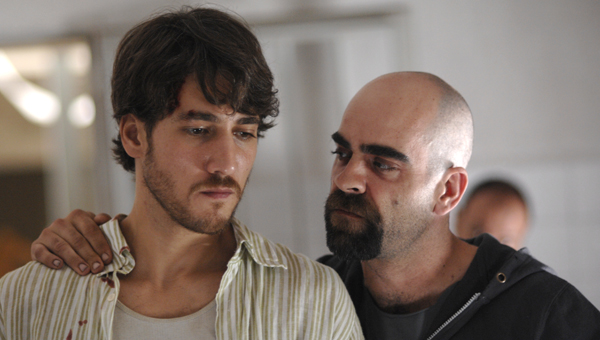Cell 211 Review

Losing your way?
It’s easier than you might think. Multi award winning Spanish film, Cell 211, is essentially a story about characters who have lost theirs.
We begin with an elderly man in a prison cell, fashioning a rudimentary shank from a piece of stone he’s found before graphically opening up the veins in both his wrists.
This is the last criminal to occupy Cell 211, but he’s not the last occupant.
Juan Oliver is about to start his new job as a prison officer, only to be knocked unconscious during a tour of said building by his erstwhile colleagues by a falling piece of masonry.
His brothers in uniform lazily carry Juan to the nearest empty cell, instead of the prison infirmary, and leave him to come around. Yet it turns out that falling ceiling was part of a bigger plan, and inmates from the high security wing of the prison soon break free.
Juan’s brave new colleagues leave him in cell 211, as rioting breaks out all around them. When he awakes, Juan swiftly realises the grave situation he’s in and pretends to be a new inmate to his latest brothers in arms.
But can Juan maintain his charade for long enough to win his freedom, or will his new identity corrupt him?
Cell 211 won a phalanx of Goya awards last year, sweeping the board in every major category. Having watched this, I’d suggest this reveals more about the competition than anything else.
That’s not to say Cell 211 is a bad film, far from it. But while the ensemble acting is uniformly great, there are enough holes in the script to take you out of the film and make you wonder if the writer got bored half way through this project.
The convenient nature in some of the acts that take place defy belief. Some incriminating video evidence of police brutality is perfectly captured on camera and broadcast on the news, before Juan miraculously stumbles upon this while still in prison.
This represents a significant turning point in his Juan’s narrative arc, where our protagonist is forced to choose between two paths; is he a guard pretending to be an inmate, or an inmate pretending to be a guard?
Of course, it’s rendered meaningless by the lazy way in which the script attempts to communicate this.
There are many other instances of things happening that don’t really make much sense in Cell 211, similar to the way that characters in a bad horror film universally dispense with logic and reason to play our out ridiculously contrived set pieces.
Which is a shame, for the first half of Daniel Monzon’s film skilfully positions the viewer to feel sympathy for the prisoners and the circumstances they live in; drawing you into the world they’ve created.
But the tension wrought by the first half of Cell 211 is allowed to dissipate, so that the investment you feel for Juan is lost in a confused ending.
So it seems even people who are successful in life can lose their way.
Jonathan Campbell